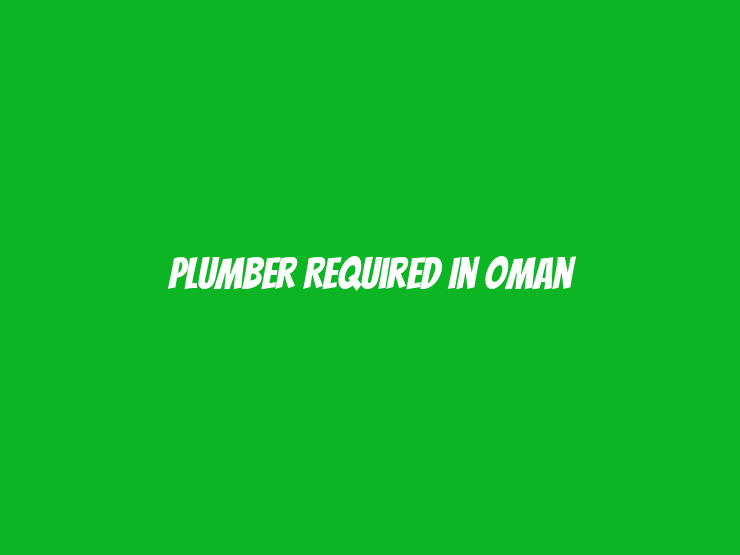A Plumber is a skilled tradesperson responsible for installing, maintaining, and repairing piping systems, fixtures, and appliances that convey water, gas, and waste in residential, commercial, and industrial settings. Plumbers play a vital role in ensuring the safe and efficient distribution of water and gas, as well as the proper disposal of waste. This profession requires technical knowledge, problem-solving skills, and the ability to work with a variety of tools and equipment to complete tasks effectively.
Dua for Job Seeking: اللهم يسر ولا تعسر واكمل ولا تكل وبارك لي فيما قَدَّرت
| Salary | 125 0MR |
| Experience | 1 – 3 Years |
| Location | Oman |
| Qualification | Any |
| Posted | 10 December 2024 |
| Job Type | Full-Time |
| Posted by | Habeebi Recruiter |
| last date to apply | apply within 15 days |
Responsibilities of a Plumber
1. Installing Plumbing Systems
Plumbers are responsible for the installation of new plumbing systems in new constructions or renovations. This includes laying out pipework for water supply, drainage, and waste management systems, and connecting fixtures such as sinks, toilets, showers, and bathtubs. Plumbers must follow blueprints and technical specifications to ensure that systems are installed correctly and efficiently.
2. Performing Repairs and Maintenance
Maintaining existing plumbing systems is a key responsibility. Plumbers diagnose and repair issues such as leaks, clogs, pipe bursts, and faulty fixtures. They use tools like wrenches, pipe cutters, and pliers to identify the source of the problem and implement effective solutions to restore functionality.
3. Reading and Interpreting Technical Diagrams
Understanding technical diagrams, blueprints, and schematics is essential for Plumbers. They use these documents to plan installations, determine pipe layouts, and identify necessary materials and tools. Precision in reading and interpreting these documents is critical to avoid errors in installation or repair.
4. Ensuring Compliance with Building Codes and Regulations
Plumbers must be familiar with local and national plumbing codes and regulations. They ensure that all work complies with these standards to guarantee safety and quality. This involves obtaining permits, following proper procedures for installations, and inspecting systems for compliance before final approval.
5. Handling Emergency Repairs
Plumbers often handle emergency repairs, such as fixing burst pipes, leaking gas lines, or clogged drains. They must respond quickly to minimize damage and risk to property and health. This requires effective problem-solving skills and the ability to work under pressure.
6. Installing Fixtures and Appliances
Plumbers install a wide range of fixtures and appliances, including water heaters, dishwashers, washing machines, and water treatment systems. They ensure that these installations are done safely, according to manufacturer specifications, and in compliance with building codes.
7. Testing Systems and Equipment
After completing installations or repairs, Plumbers perform tests to verify that systems are functioning correctly. This includes checking for leaks, testing water pressure, and ensuring that waste systems are properly vented. Testing helps to prevent issues such as backflow or contamination.
8. Advising Customers
Plumbers often advise customers on the maintenance and care of plumbing systems. They may recommend ways to prevent problems such as clogs, leaks, and frozen pipes. Clear communication and customer education are key to ensuring satisfaction and preventing future issues.
9. Maintaining Tools and Equipment
Plumbers must maintain their tools and equipment in good working order. This involves regular cleaning, proper storage, and timely repairs or replacements of damaged tools. Well-maintained tools ensure efficiency and precision in completing tasks.
10. Managing Inventory and Supplies
Effective inventory management is critical for Plumbers. They need to keep track of materials, such as pipe fittings, joint compounds, and seals, to avoid shortages on the job site. Plumbers may also need to coordinate with suppliers to restock materials as needed.
Conclusion
Plumbers play a vital role in maintaining the functionality and safety of homes, businesses, and industrial facilities. Their technical expertise, combined with problem-solving skills, enables them to handle a wide range of plumbing challenges. By adhering to codes, providing timely repairs, and ensuring quality installations, Plumbers contribute significantly to the comfort and safety of daily life.
How to apply:
Send your updated resume to our email:
Email: antoch2024@gmail.com
Disclaimer:
- We list jobs submitted by employers. HabeebiRecruiter.com does not verify employers or guarantee job details.
- Be aware: legitimate jobs never require upfront payment
